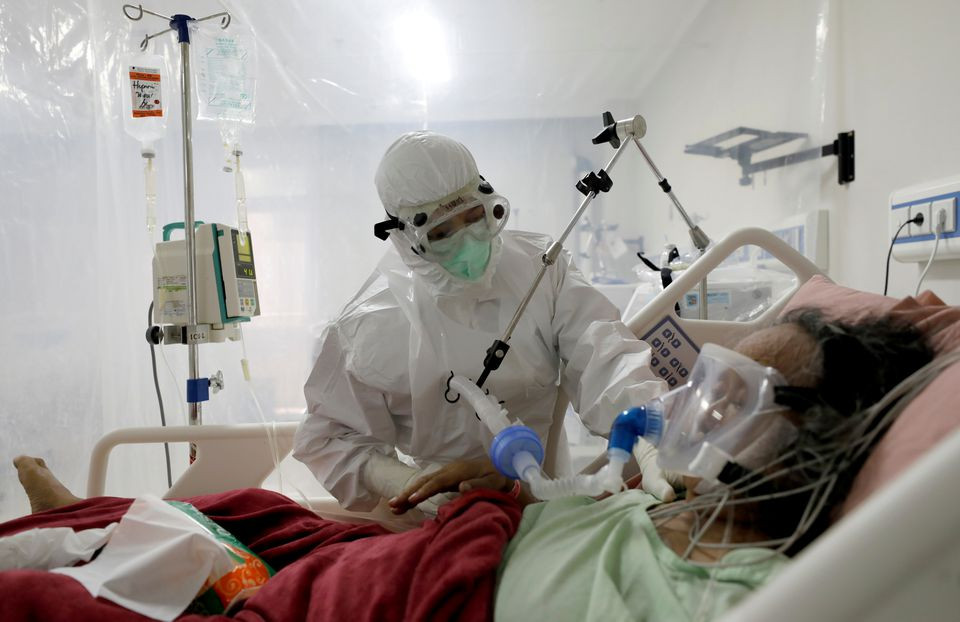Popular Reads
Top Results
Can't find what you're looking for?
View all search resultsPopular Reads
Top Results
Can't find what you're looking for?
View all search resultsOmnibus health bill better protects doctors but leaves patients ‘more vulnerable’
The government has claimed that the omnibus bill on health could better protect doctors, but Ombudsman Indonesia warned that the proposed legislation leaves a lot to be desired in terms of protecting patients against medical malpractice.
Change text size
Gift Premium Articles
to Anyone
T
he government has claimed the omnibus bill on health could better protect doctors, but Ombudsman Indonesia warned that the proposed legislation left a lot to be desired in terms of protecting patients against medical malpractice.
The bill seeks to bring in sweeping changes to the health sector by supplanting 10 existing laws, including the 2004 Medical Practice Law, the 2009 Health Law, the 2009 Hospitals Law and the 2014 Health Workers Law.
The bill has been met with mixed review from medical associations since the start of the deliberation at the House of Representatives early this month, with the All-Indonesia Doctors’ Association (PDSI) and the Village Midwives Forum (Forbides) among a dozen of proponents of the bill.
Some other more prominent medical associations, such as the Indonesian Medical Association (IDI), have strongly opposed the bill that they fear could criminalize health workers and undermine the role of medical associations.
Responding to criticism, Health Ministry spokesperson Mohammad Syahril claimed that compared to prevailing laws, the bill could provide better legal protection for doctors and other medical professionals.
"The existing laws do not provide a maximum protection for doctors, nurses, midwives and other health workers, so we've proposed [to lawmakers] to add [more provisions regarding health workers protection] to the bill," Syahril said in a statement on Monday.
"It's untrue that the bill removes legal protection for health workers, the bill will increase it instead."
Read also: Minister Budi fires back at omnibus health bill critics
The government’s proposal allows the use of out-of-court settlements to resolve disputes between patients and medical professionals. Under the proposed provisions, medical workers can also refuse to provide treatment to abusive patients and deny patients’ requests for treatment if they are against the law or medical ethics. Medical workers are also entitled to a safe and healthy working environment and protection from attacks when doing their jobs.
The bill itself, according to Syahril, already upholds several key provisions of the existing laws aimed at protecting healthcare professionals from criminal and civil liabilities in certain cases. This includes provisions that legalize abortion for victims of sexual violence and the ones that make hospital fully responsible for all losses due to medical negligence.
Compensation for patients
The Indonesian Ombudsman pointed out that the bill still fell short in ensuring that victims of medical malpractice are compensated for their injuries and losses, saying that the provision on compensation was too vague.
Ombudsman head Mokhammad Najih said when medical malpractice occurred victims were often at a loss on how or where they could go to ask for compensation.
Read also: Fears health bill could undermine BPJS Kesehatan
"In the event of malpractice, the sanction [given by the MKDKI always stops at disciplinary actions and does not include compensation payment for victims," Najih said in a recent press briefing.
He was referring to the Indonesian Medical Disciplinary Council, where patients may report an alleged malpractice and doctors may face disciplinary sanctions ranging from a warning to a temporary suspension of their medical licenses if found guilty.
The Ombudsman suggested that the provision in the bill that grants patients "the right to pursue a claim" for compensation for damages from medical malpractice be changed into that patients are "entitled to compensation" for such a malpractice.
Another red flag
While the Ombudsman is concerned about compensation, a medical legal expert from Yogyakarta-based Gadjah Mada University flagged other shortcomings of the bill in protecting patients against medical malpractice, including the fact that the government is proposing lawmakers to scrap a provision that regulates lawsuits and criminal prosecutions.
The proposed removal of the provision is "another setback for patients' rights", said Rimawati, a medical legal expert from Gadjah Mada University.
The provision in question is adopted from the 2004 law on medical practice. It says that patients can either file civil lawsuits against medical practitioners for alleged malpractice even if they have received disciplinary sanctions from the MKDKI or report the alleged culprit to the police in a criminal case.
In 2015, doctors challenged the 2004 provision with the Constitutional Court but they lost the case.
“It's crucial that the government as a regulator can protect medical workers from overcriminalization but also ensure patients are well protected against damages from malpractice," Rimawati told The Jakarta Post recently.
Read also: Govt looks to hospital-based education to solve specialist doctor shortage
She went on to criticize the bill for only ensuring patient's right to seek compensation for medical malpractice and not medical negligence.
Medical negligence is an error or mistake made without the intent to hurt a patient. Conversely, medical malpractice involves a medical practitioner failing to do or doing something with the knowledge that their actions or inaction could cause harm to a patient.
She also pointed out that unlike the existing laws, the bill offers no clear definition of what conditions constitute an out-of-court settlement. This, she said, potentially created legal uncertainty both for patients and doctors.










